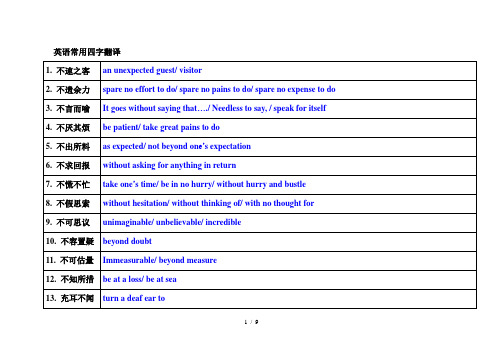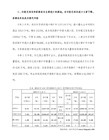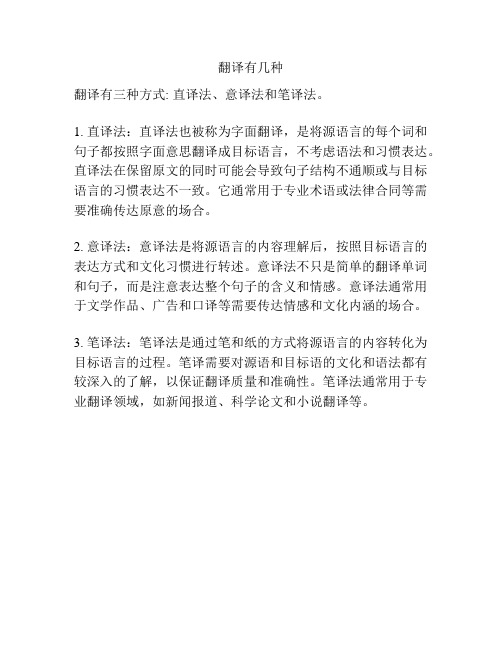翻译
英语常用四字翻译

cause and effect/ causal relationship
35.一夜成名
become famous overnight
36.记忆犹新
be fresh in one's memory
37.交头接耳
whisper to each other
38.如饥似渴
with great eagerness
be absorbed in/ concentrate (one’s attention) on/ focus one’s attention on
22.三令五申
give repeated orders and warnings
23.破旧不堪
shabby / be completely worn out
54.固执己见
stick to one's opinions
55.神志清醒
stay conscious
56.逆水行舟
sail against the current
57.尽力而为
try one's best to do/ do everything possible to do
58.精力充沛
be full of energy/ be energetic
27.无从知晓
There’s no telling that…/ It’impossible to know..
28.心不在焉
be absent-minded/ be of two minds
29.一事无成
achieve/ accomplish nothing
30.废寝忘食
neglect one’s meals and sleep
什么是翻译

什么是翻译翻译,是一种跨语言、跨文化的交流方式,通过将源语言文本转化为目标语言文本,传达相似或相同的意义和信息。
作为一门语言学和交际学的学科,翻译在人类社会中扮演着重要的角色。
翻译有着悠久的历史,早在文明诞生之初,人们就已经开始进行语言的转换和沟通。
翻译既有口头翻译,也有书面翻译,不仅在政治、经济、文化等领域发挥作用,还在科学、技术和学术交流中发挥着重要的作用。
翻译可以分为笔译和口译两种形式。
笔译是指将一种语言的书面文本转化为另一种语言的书面文本,包括文学作品、商务文件、官方文件等。
口译是指通过口头表达的方式进行翻译,包括会议翻译、陪同翻译、同声传译等。
无论是笔译还是口译,翻译者需要具备出色的语言能力、跨文化理解能力和表达能力,以确保翻译的准确性和流畅性。
在进行翻译时,翻译者需要面对许多挑战。
首先,语言之间存在差异,包括语法、语言习惯、词汇等方面,需要翻译者进行准确的理解和转化。
其次,文化之间存在差异,不同文化背景下的语言有着不同的表达方式和语义。
翻译者需要了解这些文化差异,并将其融入到翻译过程中。
此外,翻译者还需要具备良好的搜索和研究能力,以确保所提供的译文准确无误。
翻译不仅仅是语言的转换,更是一种文化的传递。
通过翻译,不同国家和地区的人们可以相互了解、交流、合作,并推动全球化的进程。
翻译不仅有助于促进文学、艺术、科学、技术等领域的交流与发展,同时也有助于缩小各种差距,促进世界和平与发展。
总之,翻译作为一门重要的语言学和交际学学科,不仅在日常生活中发挥着重要作用,也在全球化的背景下具有重要意义。
通过翻译,人们可以跨越语言和文化的障碍,实现跨国交流与合作,共同推动人类社会的发展。
翻译的类型

翻译的类型
翻译的类型可以分为以下几种:
1. 文字翻译:将一种语言的书面文字转译为另一种语言的文字,包括文学作品、商业文件、科技论文等。
2. 口译翻译:将一种语言的口头言语转译为另一种语言的口头言语,在会议、活动、演讲等场合中进行。
3. 机器翻译:利用计算机程序进行翻译,通过自动翻译系统实现将一种语言的文字或口译转化为另一种语言。
4. 本地化翻译:将产品、服务或软件等进行适应目标市场的语言、文化和法规等方面的调整,以满足特定受众的需求。
5. 笔译翻译:通过文字工具将一种语言的文字转译为另一种语言的文字,常见于文学作品、正式文件、学术论文等。
6. 口译翻译:将一种语言的口头言语转译为另一种语言的口头言语,常见于会议、活动、演讲等场合。
7. 同声传译:实时将演讲者的口语内容转译为另一种语言,通过设备供听众即时听到对应的翻译。
8. 口译陪同翻译:通常用于陪同外国客户逛街购物、旅游观光等活动,为客户提供语言沟通服务。
100个英语翻译

70.重视 attach great importance to…
71.社会地位 social status
72.把时间和精力放在…上 focus time and energy on…
73.扩大知识面 expand one’s scope of knowledge
74.身心两方面 both physically and mentally
78.缓解压力/ 减轻负担 relieve stress/ burden
79.优先考虑/发展… give (top) priority to sth.
80.与…比较 compared with…/ in comparison with
81. 相反 in contrast / on the contrary.
14.就…达到绝对的一致 reach an absolute consensus on…
15.有充分的理由支持 be supported by sound reasons
16.双方的论点 arguments on both sides
17.发挥着日益重要的作用 play an increasingly important role in…
54.在一定程度上 to some extent/ degree / in some way
55. 理论和实践相结合 integrate theory with practice
56. …必然趋势 an irresistible trend of…
57.日益激烈的社会竞争 the increasingly fierce social competition
34.为社会做贡献 make contributions to the society
什么是翻译

什么是翻译
翻译,是指在不改变语言意思的基础上,把一种语言信息转变成另一种语言信息的过程。
简而言之,不同语言之间的转换语言即是翻译。
翻译是用译语传达原语的意思,具有传译性,翻译是传递信息的活动,翻译是一门学科,科学性,艺术性。
1、翻译的目的
广义:翻译的目的是使异语读者能获得与原语读者一样的信息和感受。
翻译涉及到语言学,社会学,音韵学,音乐学,美学,心理学,逻辑学。
2、翻译有哪几种可行的方法
四种方法,直译、意译、音译、半音译
3、普通翻译完美标准、三要素
严复:信、达、雅
周氏兄弟:通顺流畅三美:意美、形美、音美(意美以感心,形美以感目,音美以感耳)
现代翻译理论三要素:传意性,相似性,可接受性
4、科技翻译完美标准
准确性,简明性,科学性(专业性)
5、翻译的技巧
分译法,合译法,省略,减字,增字添词,词性转换,语态转换,变通,表层结构,深层结构。
翻译的最高原则是要发挥译者的主观能动性,运用最好的译语表达方式,而又不违背原文的内容。
西方的对等论只要求“不逾矩”:是低标准;中国译论要求“从心所欲”,是高标准。
希望有所帮助。
经典翻译100条

1.有志者,事竟成.Nothing is impossible to a willing heart./Where there is a there is a way.2.千里之行,始于足下.The longest journey begins with the first step.3.积少成多.Every little helps.4.满招损,谦受益.Pride hurts,modesty benefits.5.世上唯有贫穷可以不劳而获.Nothing is to be got without pain but povert6.伟业非一日之功/冰冻三尺非一日之寒.Rome was not bult in a day.7.一寸光阴一寸金,寸今难买寸光阴.Lost years are worse than lost dollars.8.自助者天助.God helps those who help themselves.9.欲速则不达.More haste,less speed.10.台上一分钟,台下十年功.One minute on the stage needs ten years practice stage.11.好的开端是成功的一半.Well begun is half done.12.酒好不怕巷子深.Good wine needs no bush.13.成功源于勤奋.Industry is the parent of success.14.英雄所见略同.Great minds think alike.15.熟能生巧.Practice makes perfect.16.静水流深.Still waters run deep.17.滴水穿石.Little stone fell great oaks.18.前事不忘,后事之师.The membrance of the past is the teacher of the fut19.君子之交淡如水.A hedge between keeps friendship green.20.机不可失,时不再来.Take time while time is,for time will away.21.集思广益.Two heads are better than one.22.未雨绸缪.Provide for a rainy day.23.真金不怕火炼.True blue will never strain.24.必须相信自己,这是成功的秘诀.You have to believe in yourself.That's secret of success.25.燕雀安知鸿鹄之志.A sparrow cannot understand the ambition of a swan.26.身正不怕影子歪.A straight foot is not afraid of a crooked shoe.27.天涯何处无芳草.There is plenty of fish in the sea.28.大智若愚.Cats hind their paws.29.人不可貌相,海水不可斗量.Judge not a book by its cover.(Never judge appearances.)30.有情人终成眷属.All shall be well,Jack shall have jill.31.海内存知己,天涯若比邻.The world is but a little place,after all.32.宁为鸡头,不为凤尾.It is better to be a head of dog than a tail of a l33.良药苦口.A good medicine tastes bitter.34.知识就是力量.Knowledge is power.35.金钱不是万能的.Money is not everything.36.时不我待.Time and tide wait no man.37.少壮不努力,老大徒伤悲.A young idler,an old beggar.38.趁热打铁.Strike while the iron is hot.39.天生我才必有用.Every man has his price.40.看破生死的人能成大事.He who sees through life and death will meet with success.41.世上无难事,只要肯登攀.Nothing is impossible to a willing heart.42不入虎穴,焉得虎子.Noting venture,noting gain.43.不鸣则已,一鸣惊人.It never rains but it pours.44.胜者为王,败者为寇.Losers are always in the wrong.45.谋事在人,成事在天.Man proposes,God deposes.46.众人拾柴火焰高.Many hands make light work.47.不经风雨,怎能见彩虹. No cross, no crown.48.没有付出,就没有收获.No pain, no gain.49.不进则退.Not to advance is to go back.50.No way is impossible to courage.勇者无惧.51. 闪光的不一定是黄金.All is not gold that glitters./All that glitters is gold.52.The strong pass of the enemy is like a wall of iron,yet with firm str we are conquring its summit.雄关漫道真如铁,而今迈步从头越.53.My journey is long and winding, I will keep on exploring my way far and w 路漫漫其修远兮,我将上下而求索.54.一分价钱一分货.You get what you pay off.55.眼见为实.Seeing is believing.56.无风不起浪.Where there's smoke without fire.57.哪里有压迫,哪里就有反抗.Where there's oppression there's resistance.58. 祸兮福所依,福兮祸所伏.All the Evils to be considered with the Good, is in them, and with that worse attends them.59.Make your whole year's plan in the spring and the whole day's plan in morning.一年之计在于春,一天之计在于晨.60.细节决定成败.Details is the key to success.61.A man loves his sweetheart the most,his wife the best,but his mother longest.男人对他的情人最爱,对他的妻子最好,而对他母亲的爱最长久.62.A big tree falls not at the first stroke.一斧子砍不倒大树.63.Early to bed, early to rise makes a man healthy,wealthy and wise.早睡身体好.64.Ask not what your country can do for you;Ask what you can do for your coun 不要问你的国家能为你做什么,而要问你能为你的国家做什么.65.Repent,for the kingdom of heaven is near.忏悔吧,因为天国已经不远了.66.Rejoicing in hope, patienting in trabulation.从希望中得到快乐,在磨难持坚韧.67.Never put off until tomorrow what may be done today.今日事今日毕.68.Something attempted,something done.没有尝试,就没有成功.69.Hope for the best,prepare for the worst.好处着想,坏处准备.70.Great hope makes great man. 伟大的思想造就伟大的人.71.A rolling stone gathers no moss.滚石不聚苔,转行不聚财.72.When in Rome, do as the Romans do.入乡随俗.73.Knowledge is a measure, but practise is the key to it.知识是珍宝,而实获取它的钥匙.74.Lost time is never found again.光阴一去不复返.75.Difficulties strengthen the mind, as labour does the body.劳动强体,磨智.76.Behind bad luck comes good luck.塞翁失马,焉知非福.77.All for one, one for all.我为人人,人人为我.78.Treat other people as you hope they will treat you.己所不欲,勿施于人79.Suspicion is the poison of friendship.怀疑是对友谊所下的毒药.80.He laughs best who laughs last.谁笑到最后,谁笑得最美.81.Follow your own course, and let people talk.走自己的路,让别人说去吧82.Initiative is doing the right thing without being told.主动性就是在没告诉时做正确的事情.83.Think twice before acting.三思而后行.84.Adversity reveals genius, fortune conceals it.苦难显才华,好运藏天知.85.The water that bears the boat is the same that swallows it up.水能载亦能覆舟.86.Better be the head of a dog than the tail of a lion.宁为鸡头,不为凤尾87.A stitch in time saves nine.防微杜渐.88.Diamond cuts diamond.强中更有强中手.89.The early bird catches the worm.捷足先登.90.Whatever you go, go with all your heart.无论做什么事,一定要全力以赴.91.The good seaman is known in bad weather.惊涛骇浪,方显英雄本色.92.Where there is life, there is hope.留得青山在,不怕没柴少.93.All thing are difficult before they are easy.万事开头难.94.Life is not all roses.人生并不都是康庄大道.95.Heaven never seals off all the exits.天无绝人之路.96.Is it not a joy to have friends come from afar?97.Reading is always profitable.开卷有益.98.A gentleman acts on behalf of an understanding friend,as a woman makes her beautiful for her lover.士为知己者用,女为说悦己者容.99.Actions speak louder that words.事实胜于雄辩.100.Mastery of work comes from diligent application, and success depond forethought.业精于勤,行成于思.1. A bosom friend afar brings a distant land near. 海内存知己,天涯若比邻。
翻译有哪些类型

翻译有哪些类型
翻译可以分为多种类型,下面列举了几种常见的翻译类型:
1. 文学翻译:文学翻译是将一篇文学作品从一种语言翻译成另一种语言。
该类型的翻译要求译者不仅要精准地传达原作的意思,还要通过语言的艺术性表达出原作的风格和情感。
2. 技术翻译:技术翻译是将科技类、工程类或专业类文章、文件或手册等从一种语言翻译成另一种语言。
该类型的翻译需要译者具备丰富的专业知识和术语的理解能力,确保在翻译过程中不丢失原文的精确度和准确性。
3. 口译翻译:口译翻译是通过听懂一种语言并即时将其翻译成另一种语言。
这种类型的翻译常用于会议、旅游、商务谈判和演讲等场合,要求译者快速准确地传递原意,并能在瞬息万变的环境中灵活应对。
4. 笔译翻译:笔译翻译是将书面材料从一种语言翻译成另一种语言,主要包括文件、报告、新闻文章、小说等。
这种类型的翻译需要译者具备翻译技巧和良好的语言表达能力,以忠实于原文但又符合目标语言习惯和文化背景。
5. 法律翻译:法律翻译是将与法律相关的文件、合同、法规等从一种语言翻译成另一种语言。
这种类型的翻译要求译者熟悉法律术语和法律体系,并能准确传达原文的法律意义,避免可能的法律风险和误解。
6. 商务翻译:商务翻译是将商务文件、会议记录、商务信函等从一种语言翻译成另一种语言。
这种类型的翻译需要译者对商务礼仪和商业领域的文化背景有深入的了解,以确保在商务交流中准确传达信息和避免误解。
总之,不同的翻译类型对译者的要求和技巧有所不同。
无论是哪种类型的翻译,译者都需要具备良好的语言能力、专业知识和文化理解能力,并且能够根据具体情境和要求进行合适的翻译处理。
翻译有几种

翻译有几种
翻译有三种方式: 直译法、意译法和笔译法。
1. 直译法:直译法也被称为字面翻译,是将源语言的每个词和句子都按照字面意思翻译成目标语言,不考虑语法和习惯表达。
直译法在保留原文的同时可能会导致句子结构不通顺或与目标语言的习惯表达不一致。
它通常用于专业术语或法律合同等需要准确传达原意的场合。
2. 意译法:意译法是将源语言的内容理解后,按照目标语言的表达方式和文化习惯进行转述。
意译法不只是简单的翻译单词和句子,而是注意表达整个句子的含义和情感。
意译法通常用于文学作品、广告和口译等需要传达情感和文化内涵的场合。
3. 笔译法:笔译法是通过笔和纸的方式将源语言的内容转化为目标语言的过程。
笔译需要对源语和目标语的文化和语法都有较深入的了解,以保证翻译质量和准确性。
笔译法通常用于专业翻译领域,如新闻报道、科学论文和小说翻译等。
- 1、下载文档前请自行甄别文档内容的完整性,平台不提供额外的编辑、内容补充、找答案等附加服务。
- 2、"仅部分预览"的文档,不可在线预览部分如存在完整性等问题,可反馈申请退款(可完整预览的文档不适用该条件!)。
- 3、如文档侵犯您的权益,请联系客服反馈,我们会尽快为您处理(人工客服工作时间:9:00-18:30)。
Assignment
• 1. Please translate Unit 2 lesson 3 “Abraham Lincoln”. • 2. Please translate Unit 2 Exercise VII (P34) “王冕”
• 徐霞客有“穷九州内外,探奇测秘”之志, • “九州”指哪里? • Xiu Xiake had the aspiration of “traveling to every corner of China and exploring the unknown”; 具体到抽象
• 父亲早逝,母亲竭诚支持他的志趣, • His father died when he was very young? • 以上翻译是否妥当? • His father died in his early year (at a young age), but his mother fully supported him in his pursuit,
• 并且为儿子亲手缝制“远游冠”,以壮行 色。 • and made “travelling cap/hat” (意译)by herself to encourage his(增代词,理清逻 辑关系)travels. (合句)
• 与一般人的“有方之游”不同,徐霞客追 求的是不问道里,不计行期的“万里遐 征”。 • “有方之游”是何意? • “万里遐征”是具体所指吗? • Different from/unlike those who travelled with selected routes(无对等词,意译), Xu tended to travel without planning where his destination is and how far he will go.
People Translation
பைடு நூலகம்
千古奇人徐霞客
• 徐霞客(1587-1641),名宏祖,字振之, 号霞逸,江阴(今属江苏)人。他的好友 陈继儒因他酷爱旅行,经常餐霞宿露于山 林野泽之间,为他取号“霞客”。徐霞客 有“穷九州内外,探奇测秘”之志,父亲 早逝,母亲竭诚支持他的志趣,并且为儿 子亲手缝制“远游冠”,以壮行色。
• 即使栖身山野,也点燃枯枝照明,坚持记 录。 • Even when he perched himself in the mountains, he still lit dead twigs as light to keep on writing his travel record. • 原文省略了“施动者”,译文作了补充, 为什么?
Hints for translating this passage
• Your translation should be easily understandable and intelligible to foreign receptors. • You may not find exact equivalent words in English for some expressions, so literal translation is not justifiable in some cases.
• 如此日积月累,除佚散者之外,遗有六十多万字 的游记资料,后人辑为《徐霞客游记 》。 • 如何处理句子结构? • Accumulated day by day and month by month (over a long period), except those had been lost, there were still over 600,000 words of travelling diaries left, which were edited by people after him as “Travelling Notes of Xu Xiake”.
• 与一般人的“有方之游”不同,徐霞客追 求的是不问道里,不计行期的“万里遐 征”。从二十二岁到去世的三十多年间, 他旅泊崖栖,风餐露宿,涉洪流,探洞穴, 滑陡坡,攀险峰,又是遇盗绝粮,挫折累 累,始终没有动摇他的意志。
• 在漫长的旅游生涯中,徐霞客每到一处都 注意考察山川形势、地质水文、物产名俗 等,用日记的形式加以记录,即使栖身山 野,也点燃枯枝照明,坚持记录。如此日 积月累,除佚散者之外,遗有六十多万字 的游记资料,后人辑为《徐霞客游记》。
• 在漫长的旅游生涯中,徐霞客每到一处都注意考 察山川形势、地质水文、物产名俗等,用日记的 形式加以记录, • During his long journey, wherever he went,Xu made a careful study of the local mountains and rivers situation, geographic and hydrologic features, customs and products,and he (增词) recorded all of them (增词) with diaries. • 英文讲究逻辑,增词使逻辑关系更清晰。
• 他的好友陈继儒因他酷爱旅行,经常餐霞 露宿于山林野泽之间,为他取号“霞客”。 • He keenly loved travelling, and often ate and spent his night outdoors(意译) during his travels,(避免误解,加入时间背 景) so his friend Chen Jiru gave him a nickname “Xiake”. • (调整语序,使之符合英文表述习惯)
• 从22岁到去世的三十多年间,他旅泊崖栖, 风餐露宿,涉洪流,探洞穴,滑陡坡,攀 险峰,又是遇盗绝粮,挫折累累,始终没 有动摇他的意志。 • 典型的中文“竹节型”结构,如何将此结 构转为英文“葡萄串型”结构?
• During the 30 years from 22 years old to his death, he had undergone all kinds of hardship: (概括性增词,转换句子结构) sailing in big lakes, sleeping outdoors, walking in floods, exploring caves, walking on steep slopes, climbing dangerous peaks, being robbed and having no food left, etc., but which had never shaken his mind.
• 千古奇人徐霞客 • Historic Legend of Xu Xiake
• What’s your choice for basic tense in your translation?
• 徐霞客(1587-1641),名宏祖,字振之,号霞 逸,江阴(今属江苏)人。 • Xu Xiake, whose given name was Hongzu, courtesy name Zhenzhi, and assumed name Xiayi, (没有对等词,采取意译) lived in Jiangyin (located in present Jiangsu province). ( 改换说法) • (words with Chinese characteristics have to be translated in such a way so that misunderstanding will not arise.)
